"House of Cards," Episodes 1-3: Bloggers With Their Wine
by Jane Hu and Carrie Frye
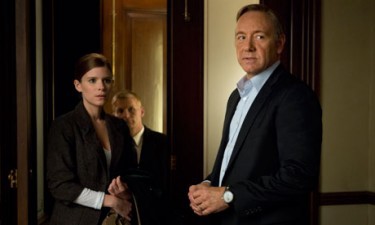
Carrie Frye: Jane, so I was lazing around Saturday morning when I saw a series of ecstatic tweets from you about the amazingness of “House Of Cards.” Up till then I’d only been paying dim attention to the show’s release (basically, I knew it was a series released on Netflix about Washington politics that, disappointingly, did not seem to feature any secret vampires), but on your word, I tried an episode at lunch. And then, next thing I knew, “Portlandia” Battleship Galactica marathon style, it was dusk… and then it was 10 p.m. and I had no circulation left in my legs.
I’m now on episode 7 and view it as a triumph of will that the number stopped there. You’ve watched the entire first season?
Jane Hu: When it comes to inadvertent TV marathons, it’s best not to lie: I watched the first episode in bed Friday morning (just hours after Netflix released the whole 13 episodes of season 1) and had finished them all in a little over 24 hours. Season 2 is now on my list of most anticipated things, but there’s also no rush. For the moment, I’m still digesting the experience of binge-viewing (ick, I dislike this term, I really do; I use it in the spirit of the show’s rampant food metaphors!) the first season. I’m wholly committed to these characters now — all I want is to talk about them — so it’s ironic to me that Netflix’s release model here actually discourages recapping.
Carrie: Yes, the difficulty of recapping something gargantuan like this! As you and I discussed, we’ll talk about episodes 1–3 here, so spoilers will flow freely for those. But there’ll be no spoilers for any episodes beyond that. What an exciting new era of conversational boundary-setting we’re in!
Jane: As it goes, the creative team for “House of Cards” described the show in terms of long-form film, further emphasizing that it was not a text to be chopped up and analyzed. But this only makes me more interested to view it as TV. What does it look like after one episode, two, or three?
Carrie: So I’ll admit: I was resistant during the first episode. There’s one conversation between the protagonist Francis (or Frank) Underwood (Kevin Spacey) and his wife Claire (played by Robin Wright, with Jamie Lee Curtis’ hair) in their living room, and the exchange felt very self-consciously theatrical, like you could see the script tapped out over the actors’ heads as they were speaking the lines:
Claire: You don’t usually underestimate people, Francis.
Francis: I know. Hubris, ambition.
Claire: You should be angry.
Francis: I’m livid.
But midway through that same episode, a guy asks Zoe, the young reporter, if he can come upstairs after a night out together, and she says, “Oh Brian, you’re sweet, really. But if I was going to fuck you, you’d know.” That was the official beginning of love for me — minute 25.
Jane: I LOVE that line. Something else that seems like it could potentially bug people is Frank consistently breaking the fourth wall, but I didn’t mind it so much — it actually grew on me! The convention also presses the question of what kind of animal this Netflix-borne show is: an isolated play, a film, serial television? All of the above? “House of Cards” has been in the works for years, but the timeline of its making is rather different from that of its reception. What did you think of how timely the show was — what with the 2013 election, secretary of state plotline, the use of Twitter (!), and its portrayal of various news outlets?
Carrie: Yes, and we see an inauguration take place, although unlike the Obamas, the president (so far) is a bit of a nonentity and I didn’t even register the First Lady except for a flash of red coat. For it being Walker’s inauguration, the show doesn’t pay much attention to him; all of the interest is at the fringes of the scene around him, which seems the point.
About the news organizations: I believe Choire ducked out on the show after the first scene where the reporter Zoe barges into the newsroom and says, “Put me online! Give me a blog! First person! Subjective!” And certainly it seems weird that, in 2013, she’d have media colleagues in their early 40s who pronounce “blogging” disgustedly as “blaughing” — which, sure, if we’d all known how long the word would stick around we probably would have picked a better one — and call her things like “Twitter twat.” (At this point it’s more complicated — but then being a coroner/medicine woman/vampire slayer is probably more complicated than it looks on TV, too.) Still, her frustration at being a cub reporter stuck doing features on new bike lanes felt true enough. How did you feel about the reality of Zoe’s world?
Jane: Choire, that’s literally 7:15 minutes into the pilot (I just checked, and that’s including the 2-minute long credit sequence)! Ah well, I loved feisty Zoe Barnes, though this is probably partly due to some kind of greedy over-identification. (Also loving: her greediness.) Zoe sitting cross-legged on the floor of her one-room apartment, typing furiously on her laptop, is my version of the modern heroine. It also gave me some Social Network flashbacks, except this time the Mara sister is on gossip’s sending end.
You’re right, though, I don’t know if a publication comparable to the stature of the (fictional) Washington Herald would be so anti-internet, even in 2008 when David Fincher first started thinking about “House of Cards.” And Zoe’s boss, Tom! He comes off very silly, so threatened by the Youngs (though I don’t think he’d ever use that term, or get it) to the point of caricature. As another Herald staffer enunciates: Double Yoo Tee Eff?
But screenwriter Beau Willimon (of Ides of March fame) is good at writing female characters, and Zoe gets plenty of room to develop, even in the first three episodes. This is what she looks like when we first see her, tripping over her sentences after she basically trips into Tom:
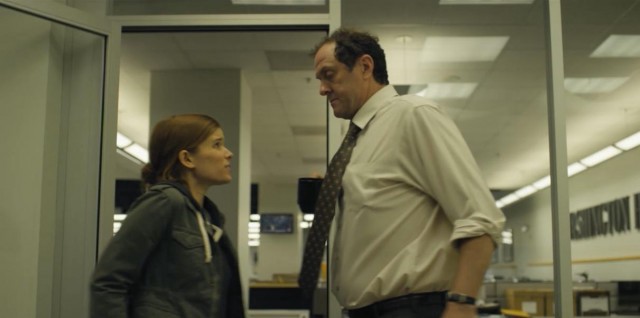
This is what she looks like by the end of episode three in front of Tom’s desk (note the height reversal!) pointing out his ageism and… “Are you accusing me of sexism?” Tom asks, to which Zoe replies: “Just making an observation.” His response, which got a laugh from me: “No TV for a month.”
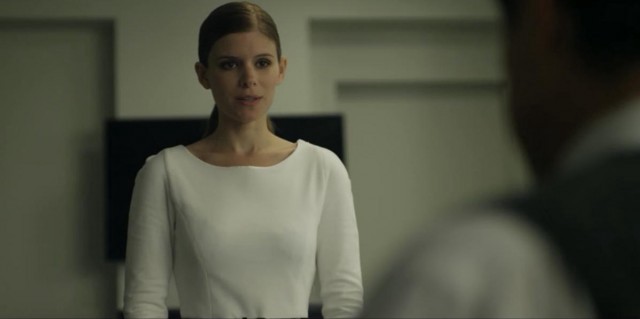
Tom needs to catch up if he thinks TV interviews are what’s going to expose the Herald’s problems. What did you think? You deal with those sticky blaughers all day!
Carrie: Well, you know Zoe’s a filthy blaugher because she’s always in the bathroom! (She’s the only character we see go to the toilet in these episodes! And we see it twice!) That’s where blaughers spend their time when they’re not drinking wine in front of their laptops (actually, this might be true? Don’t break the seal, Zoe!). Although I was intrigued by a world where a scoop on an education bill and a second story on a Secretary of State nominee would make her a cable-news sensation.

Still, like you, I like Zoe! I like that the show features a young woman with super-naked ambition and smarts and greed and doesn’t make her straight-up evil for having those qualities. (As well as lots of women of other ages, too — which we can chat more about later.) I like Zoe’s intense pointy vulpine face and her stick-out ears when her hair’s pulled back and her okayness with “being in a very grey area, legally, ethically.” (She reminds me a little of Anna Kendrick’s character in Pitch Perfect in her monomania and loner-ness and offhand slouching confidence.) Kate Mara who plays her has this great quality of appearing very young & diminutive in some scenes but having this appealing, assured voice, so the audience can see how people might constantly underestimate her and be wrong for doing so.
(It also occurs to me that if you are creating a show that’s hard to recap, how smart to give the bloggers and journalists and recappers a stand-in character with whom to over-identify as a stand-in and incentive of interest.)
Jane: Not just on the toilet but pensive on the toilet. What does this mean, besides making her more vulnerable and, as you said, “naked” to the viewer? Somehow the toilet humanizes her!
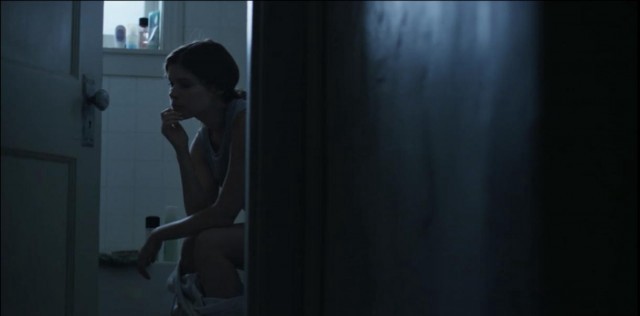
Carrie: Maybe this is to emphasize what a Millennial she is — haven’t you heard, Jane, your generation, no boundaries! (Gen Xers always shut the door when we use the john.)
Jane: I refuse to put on pants while at home, roommates be damned! Then I Vine it (for posterity). All in all, I am very invested in this character. I’ve taken to sipping a mug of wine while watching TV late at night now because, y’know, that counts as work… right? BLAUGH.
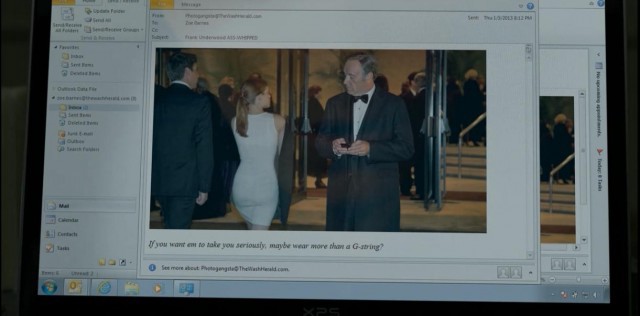
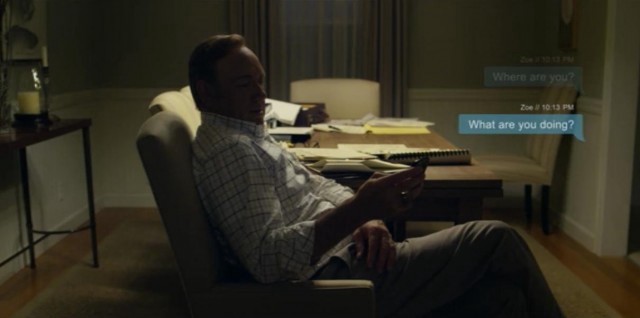
Zoe is also great with the technology. I totally buy that she’s more media savvy than anyone else on the show, like when the photog department emails her a sassy line about needing to wear more than a G-string to be taken seriously, and her immediate impulse is to google Majority Whip Francis Underwood and shoot back with one line: “He looks pretty serious to me.” Her suggestive text exchanges with Frank make me a little anxious at times (maybe season 2 will incorporate some snap chats?), and I’d be a little more worried about her if I didn’t trust that she’s just quicker than the rest of them.
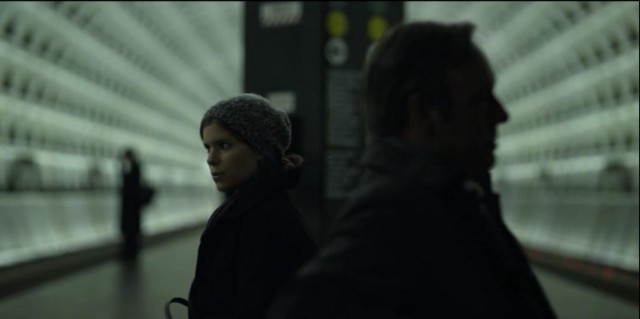
To some degree, “House of Cards” shows how one of the few potential rivals and equals to Frank is a petite female blaugher (I’m sorry, I’ll stop) who might prove to be as ruthless as him when it comes to getting what she wants. But, overall, the show is being told through Frank’s perspective — if Zoe is my heroine, Frank is definitely The Anti-Hero. So, can we talk about his intimate direct addresses to the camera?
Carrie: Ferris Bueller’s Washington years. I was agnostic about the speaking directly to the camera — it was part of my initial internal debate about the show (along with an active line of “Do I think Kevin Spacey is pulling off this Southern accent?”). Which, as I type out these equivocations, makes me realize how much of getting into any show is like being out on a first date, with the constant “Am I enjoying this? Do I like him/her?” self-checks. (Relatedly: if you extend this metaphor out, by releasing the entire season at once, Netflix was effectively telling viewers: “This show is emotionally ready for commitment.” Which given how often great shows get axed by networks — “Don’t Trust the Bitch in Apartment 23” cough — is a smart wooing strategy.) Anyway, fourth wall! As I said, I was unsure, but then that shrug Frank gives at the camera at the inauguration is splendid and funny. Those digressions set up an intimacy between him and us; if he lies to others — and he does all the time, in a fantastically smiling Southern style — he’s real with us. Also: He so has an eye on his role in recorded history and posterity, it makes sense that he would act as his own Boswell.
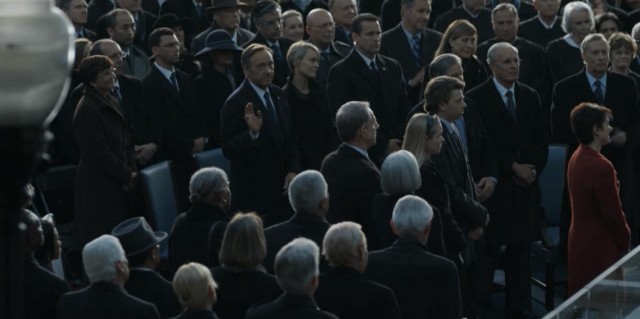
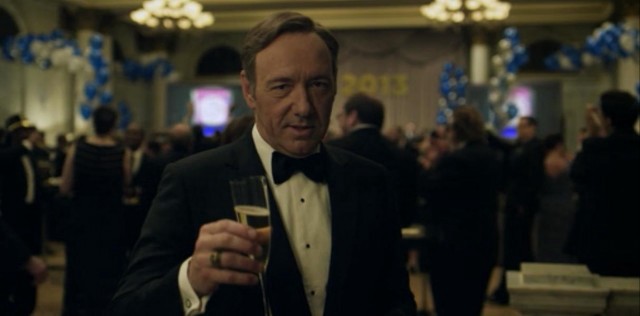
Jane: When Frank breaks the fourth wall approximately one minute into the pilot, it’s like him skipping dessert, skipping foreplay, and asking you for your undivided attention (and commitment) to all he’s about to say and do next. It’s a lot! I can understand how one might choose to flee early. But then he tilts his head at the camera, shoots us a meaningful glance, and suddenly we’re under his thumb (and only later realize that we’ve been so from the start). Frank talks a lot about loyalty and trust — sometimes to his political partners, sometimes with his wife, other times to us — that I might seriously question how honest he’s being with the viewer in those direct addresses, if I weren’t so taken with the fact that Netflix has “committed to at least 26 episodes for the serialized drama.”
It’s so much easier to give yourself into something when you’re promised, or at least expecting, to be rewarded in turn. This sort of seems like the underlying premise to “House of Cards.” Topple how they may! At least we’ll have seen how it was all built. That’s fine, show: I’ll pay for the first few dates.
Oh my, about Frank’s — or should I say Francis’ — Southernness. The original BBC version obviously does not have a Southern Frank (Urquhart in their case, played by Ian Richardson), and I thought it was at least an interesting touch for his character in the American one. For a moment, while watching Frank maneuver his Southern background (the prominence of his accent fluctuates), I felt compelled to shout “Dick Whitman!!!” But Frank isn’t trying to hide his colonial roots so much as thrive on them: Every trip back to his hometown of Gaffney, he tells us, “is a reminder of how far I’ve come.” Though there are plenty of moments too when the Southern gentleman (or at least his charm) really comes through in Frank’s interactions with others. What did you think of the Southern portrayal? Was it convincing??
Carrie: Apparently I’ve lived in the South just long enough to get distracted by terrible Southern accents in movies and TV. (You’re from Canada; do you experience that with Canadian accents?) But I feel the adaptation of Frank to Southerner was smart. It allows him access to a certain Shakespearean grandiosity of expression. (I was in a bar in Oxford, Mississippi, last year and this youngish guy, maybe 24, told me, arms thrown out, “I am going to let time devour me.”) If Frank were, say, the representative from Minnesota, it’d be more startling to hear him say lines like, “I love her more than sharks love blood.” (Uff da!) The Southernness also lines up, hilariously, with Frank’s being very warm and charming to people’s faces while sinking the knife in one scene later. For example, if chief of staff Linda Vasquez had spent any time running in Southern lady circles she would never have trusted Frank’s sweet, expansive “Oh, my pleasure” so soon after she screwed him on the Secretary of State nomination.
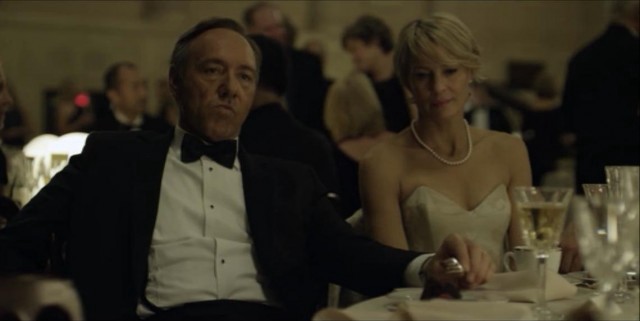
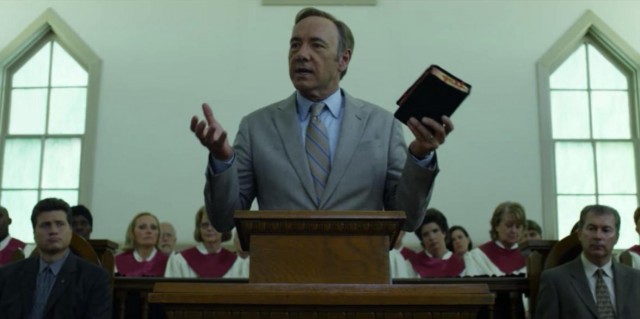
Jane: I love that Shakespearean and Southern locution could be collapsed into the world of DC politics and make perfect sense — only on TV! I actually don’t find Spacey’s accent distracting, and maybe it’s my theatrical sensibilities, but, on top of the direct address, I enjoy the casual inclusion of august declarations throughout this show. It was really great to see the difference between church in DC and church in Gaffney, where the former is mostly all business and cynical innuendos, while the latter is loud reaction gasps to Frank’s florid “impromptu” sermon about his childhood hardships. Up there on the pulpit, however, Frank just felt so in character — aphorisms are his bag! Later, he lectures to us: “What you have to understand about my people is that they’re a noble people. Humility is their form of pride. It is their strength; it is their weakness.” Do you think Frank gets a book deal in the next season?
(As a Canadian I know: no one who isn’t Canadian makes shows about Canadians unless in the form of parodies, so the accent works in all cases. We are a humble people as well.)
OK, but enough about Frank. Looking at those supposedly discardable characters orbiting around Frank, I was particularly drawn toward Meacham — Frank’s guard, who suddenly shows up in episode 3 after his predecessor Steve falls ill. (Talk about dispensable.) But Meacham stays, and what’s more, he almost seems cast as a visual distraction from Frank.
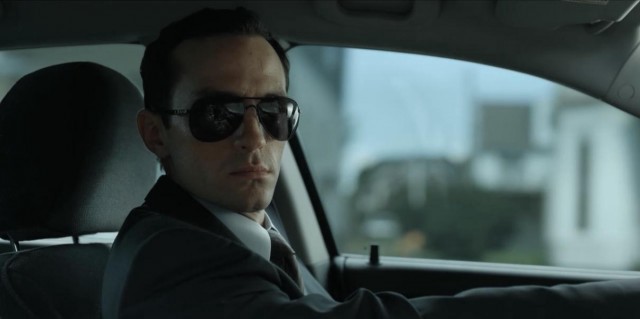
More than anyone else in “House of Cards,” Meacham looks a leading man, yet he is probably the weakest, most nervous presence on screen in that episode, constantly apologizing and thanking Frank for his “patience.” Oh, Meacham. I felt for him. Did you notice him too?
Carrie: I noticed him but not so much as Frank’s office lieutenant, Doug, with his bullet-shaped grizzled weasel head. But Meacham is fidgety — and I wonder what prominence he’ll have. With every character like him, you think “Are you the loaded gun on the mantelpiece?” Episode 3 ends with him being asked to drop off some flowers at the Underwood home, and instead of just setting them by the sink, he takes it upon himself to put them in a vase and set them on the dining room table just-so, before walking out.
Jane: Meacham is my MacGuffin. He seems so out of place — so handsome, yet incompetent — that you wonder why he’s in the show at all. But (and not to give any spoilers) for a series so deliberate about its episode endings, which usually come in the form of a cliffhanger, I think this one is defining in its understatedness. White tulips (picked from Frank’s front yard in Gaffney, the products of Claire’s once and only venture in gardening) as the literal centerpiece of this closing scene felt, unlike most everything else in this show, small on many levels. Neither Claire or Frank will ever know, nor would they care, about the deliberation Meacham put into placing the tulips — but the camera is intent on letting us know. With a show so fixated on the perspectives of powerful individuals such as Frank, Claire, and, increasingly, Zoe, I’m trying to understand why it would want to leave us with this bit of detail shared only between Meacham and the viewer.
Carrie: We will have to see whether that fidgeting with the vase is a sign of Meacham’s intrusiveness, an early signal of his future fealty to the Underwoods, or just a sign that he is someone who really, really cares about getting cut flowers into water.
Next: “House of Cards,” Episodes 4–8: Who’s Making Themselves Available? and “House of Cards,” Episodes 9–13: The Ones Where Everything Goes Nuts
Jane Hu is a Twitter twat. Carrie Frye blaughs.
